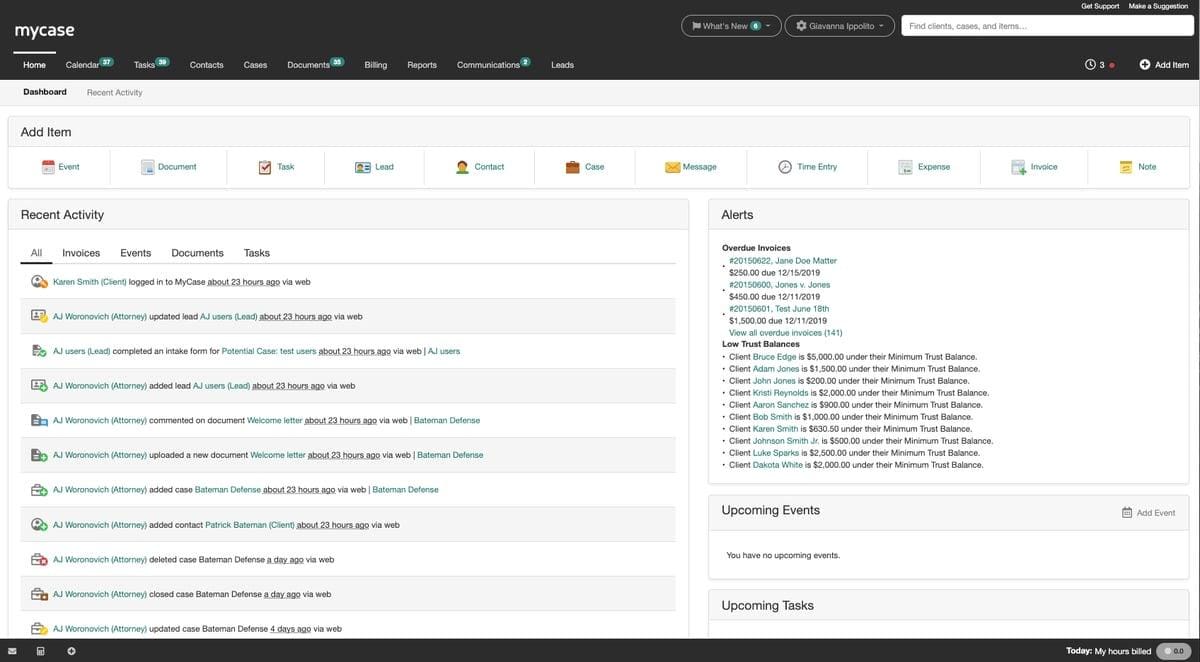10 Best Legal Tech Companies of 2025
10 Best Legal Tech Companies of 2025
Legal tech is changing how law firms work, even as we speak. With the emergence of these modern solutions, integrating more intuitive tools into your law firm has become necessary.
However, budgets are limited, and there are many legal tech tools from which to choose.
In this article, we’ve compiled a list of the 10 best legal tech companies worth investing in.
1. Briefpoint.ai
Briefpoint.ai takes away the burden of one of the most repetitive legal processes: discovery document preparation.
When done manually, law firms would typically have to spend hours–if not days–on drafting discovery documents. And that’s just one part of the tedious discovery process.
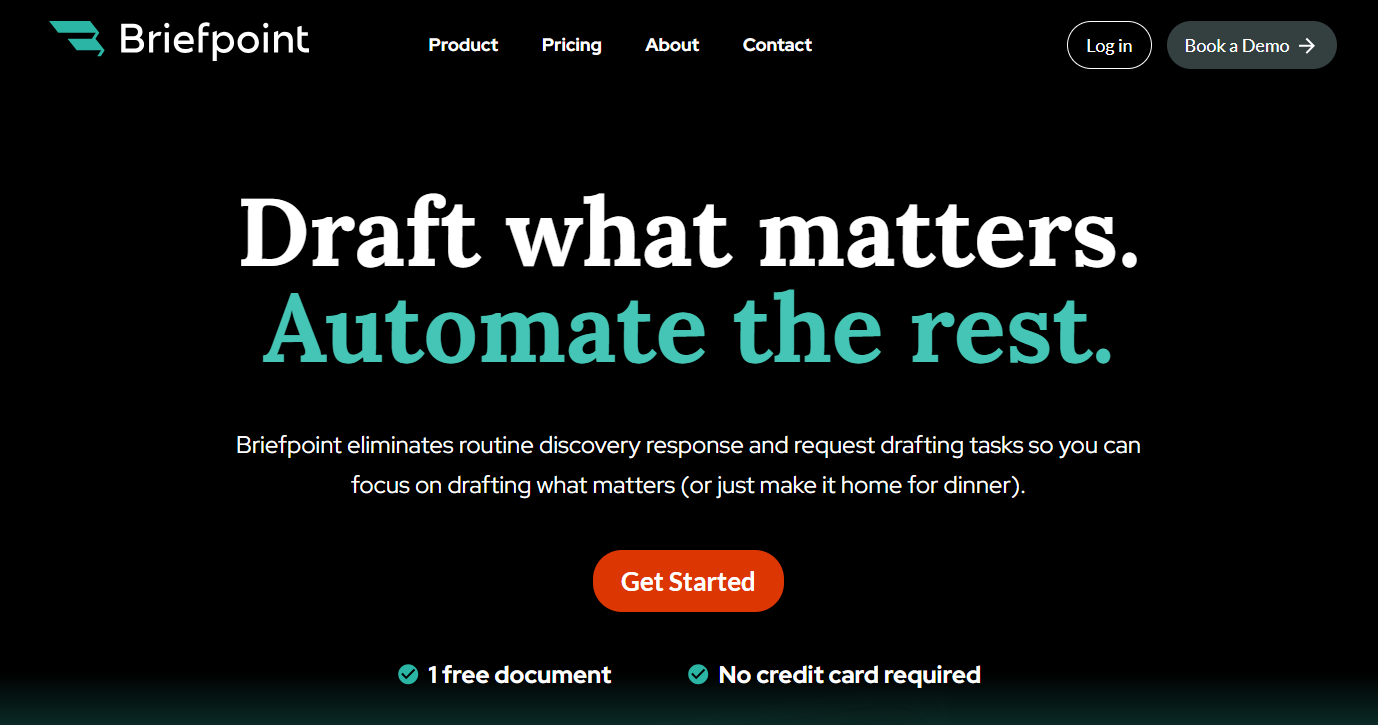
With Briefpoint’s generative AI, legal teams can draft discovery response documents in minutes. These include but are not limited to:
- Requests for admission
- Requests for production
- Interrogatories
The process is as simple as it can be:
- Upload your opposing counsel’s discovery request—Briefpoint automatically extracts key details like court name, case number, and parties involved.
- Select objections and responses—Briefpoint pre-fills objections and responses for each request or interrogatory, allowing you to customize as needed.
- Use Briefpoint Bridge to collect client input—select the interrogatories that require client responses, send them a plain-English questionnaire, and seamlessly integrate their answers into the document.
- Download your draft in Microsoft Word—get a fully formatted, near-complete document in minutes, ready for review and final edits.
Briefpoint.ai saves legal professionals thousands of dollars every year. More importantly, lawyers and paralegals can spend the extra time on more impactful and engaging work.
2. Clio
Clio has long been the answer for law firms and legal professionals looking for a simple yet effective practice management system.
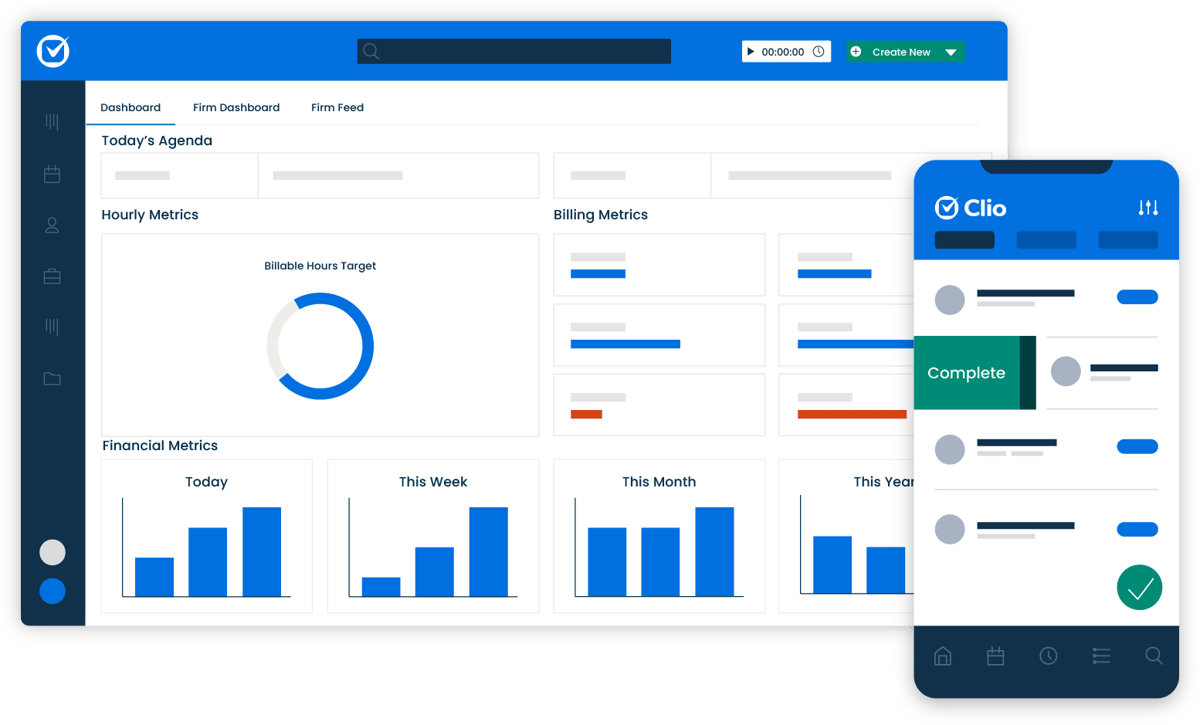
Source: G2
Its comprehensive suite is remarkably user-friendly and accessible to a broad range of professionals, regardless of their technical expertise. It includes:
- Case management: Organizes client matters, documents, and communications in one centralized platform.
- Time tracking & billing: Tracks billable hours, generates invoices, and integrates with payment processing tools.
- Document management: Stores, organizes, and shares legal documents securely with version control.
- Client intake & CRM: Streamlines client onboarding with customizable intake forms and contact management.
- Task & workflow automation: Automates routine legal workflows to improve efficiency and reduce administrative tasks.
- Secure communication: Provides encrypted messaging and client portals for confidential interactions.
- Integrations & API access: Connects with legal tech tools like QuickBooks, Microsoft 365, and Zoom.
As a cloud-based litigation platform, Clio offers the flexibility required in today’s legal environment and allows work to be conducted from virtually anywhere.
This adaptability is especially valuable given the increasing shift towards remote and flexible working arrangements.
3. Everlaw
Everlaw is a global leader in advanced discovery and litigation support solutions. Its platform is known for merging cutting-edge technology with an intuitive design to manage the complexities of legal document analysis and case preparation efficiently.
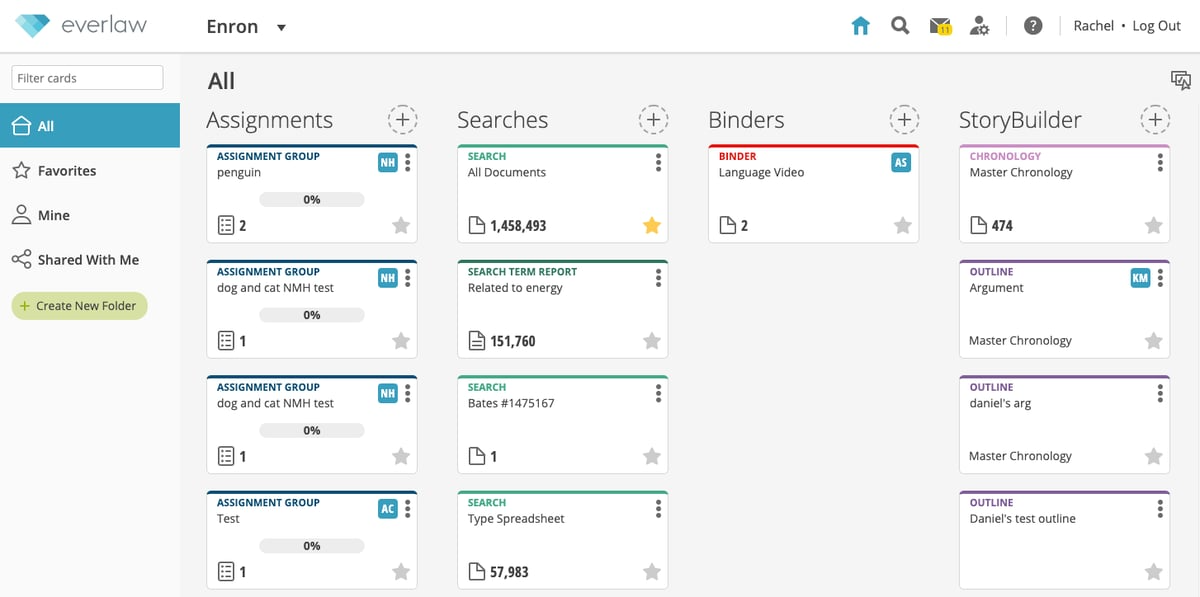
Source: G2
Its tools are designed to simplify the electronic discovery process. This includes:
- Predictive coding: Uses machine learning to prioritize and categorize documents, speeding up the review process.
- AI-powered document review: Automates document analysis, helping legal teams quickly identify relevant information.
- Advanced search and filtering: Offers powerful search capabilities with Boolean operators and AI-driven suggestions.
- Redaction and annotation tools: Allows users to highlight, redact, and comment on key information directly within documents.
- Case timeline visualization: Helps legal teams track case progress and connect key events through interactive timelines.
- Automated transcription: Converts audio and video files into searchable text for faster review.
What’s also great about Everlaw is how it champions team collaboration. The platform includes tools for annotation, tagging, and sharing documents, enabling team members to work together regardless of their physical location.
4.LawVu
LawVu combines multiple aspects of legal operations into one convenient platform. This approach is meant to address the specific needs of in-house corporate legal departments and improve the efficiency, collaboration, and overall management of legal matters.
Source: G2
The platform offers:
- Matter management: Centralizes all legal matters, documents, and communications in one platform.
- Contract lifecycle management: Tracks contracts from drafting to execution with automated workflows.
- Spend management: Monitors legal expenses, invoices, and budgets to control costs.
- Knowledge management: Stores and organizes legal documents, templates, and historical case data.
- Task & workflow automation: Streamlines legal processes with automated task assignments and approvals.
- Collaboration tools: Enables secure communication and collaboration between in-house teams and external counsel.
Plus, LawVu’s platform includes advanced analytics and reporting capabilities, which allow legal services to get a clear grasp of their operations, assess performance, and make data-driven decisions to improve their services.
5. LeanLaw
LeanLaw is a smart solution for smaller and mid-sized law firms looking to mesh their legal practice needs with solid accounting.

Source: LeanLaw.com
By teaming up with QuickBooks Online, LeanLaw taps into powerful accounting tools and makes the whole financial side of running a law firm—from keeping track of billable hours to keeping an eye on the firm’s finances—a lot smoother and more straightforward.
Here’s a look at some of its key features:
- Time tracking: Tracks billable hours with real-time timers and manual entry options.
- Automated billing & invoicing: Generates invoices with LEDES compliance and integrates with QuickBooks.
- Trust accounting: Manages client trust accounts with built-in compliance safeguards.
- Expense tracking: Logs case-related expenses and links them to client invoices.
- Revenue & compensation reports: Provides insights into firm profitability and attorney compensation.
- Matter management: Organizes cases, documents, and client information in one place.
- Client portal: Enables secure client communication and access to invoices.
LeanLaw also offers a package for organizing client details and internal resources, so everything you need is just a few clicks away.
6. Smokeball
Smokeball is legal practice management software geared specifically towards small law firms and solo practitioners. It focuses on streamlining repetitive legal processes, which can reduce the time lawyers spend on administrative work.

Source: G2
Some of its best features include:
- Case & matter management: Centralizes case files, client communications, and documents in one platform.
- Document automation: Generates legal documents quickly using customizable templates and client data.
- Task & workflow automation: Streamlines legal workflows with automated task assignments and reminders.
- Firm insights & reporting: Provides real-time analytics on firm performance, revenue, and productivity.
- Secure client communication: Offers a built-in client portal for messaging and document sharing.
Billing and time tracking are other areas where Smokeball excels. It automatically tracks the time spent on each task and integrates this with its billing system, which simplifies the invoicing process and makes sure that no billable hour goes unrecorded.
7. Ironclad
Ironclad is a complete and scalable solution for teams drowning in contracts and looking for a better way to get things done.
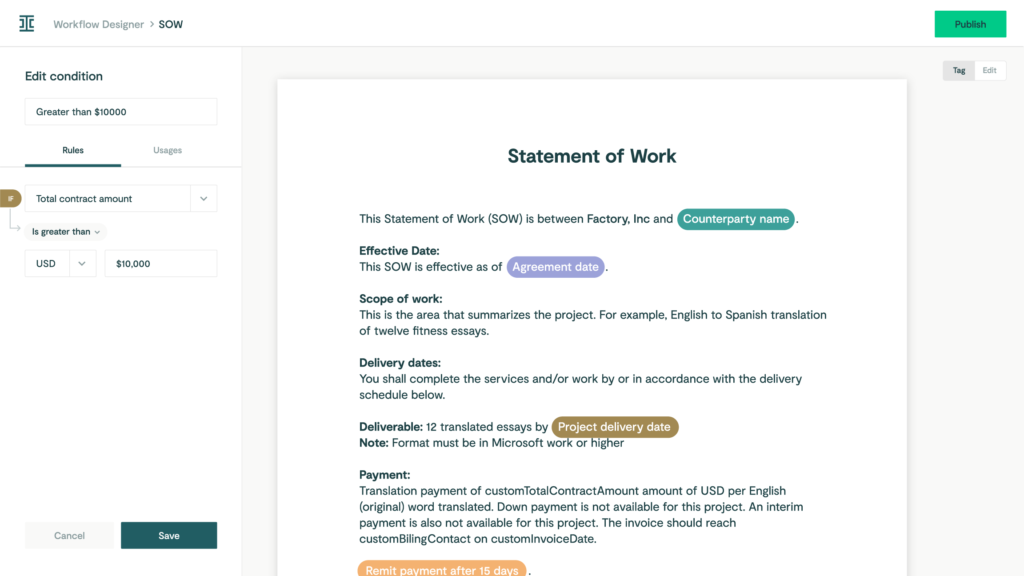
Source: G2
The contract management tool automates the creation, execution, and management of contracts with the following features:
- AI-powered contract review: Uses AI to analyze contracts, identify risks, and suggest edits.
- Automated contract generation: Creates contracts using templates and pre-approved clause libraries.
- E-signature integration: Integrates with DocuSign and other e-signature platforms for seamless contract execution.
- Real-time collaboration: Allows legal, sales, and procurement teams to collaborate on contracts within the platform.
- Contract repository & search: Stores all contracts in a secure, searchable database with advanced filtering.
- Compliance & audit trails: Tracks all contract changes and approvals for compliance and reporting.
In addition, this tool can integrate with other tools you’re already using. Its integration capabilities make sure that contract management becomes a cohesive part of the broader business ecosystem and leads to smoother workflows across departments.
8. MyCase
MyCase is a legal practice management software that simplifies legal workflows and keeps them running smoothly. It tackles everything from case management and client communications to billing and time tracking into one neat platform.
Source: G2
This means lawyers can spend less time juggling different tools and more time focusing on their clients’ needs.
With MyCase, everything you need to run your law practice is right there in one easy-to-use interface. Its core features include:
- Case management: Organizes case details, deadlines, and documents in a centralized system.
- Document automation: Creates, stores, and manages legal documents with customizable templates.
- Time tracking & billing: Logs billable hours, generates invoices, and integrates with online payment processing.
- Secure client messaging: Provides a built-in client portal for encrypted communication and case updates.
- Task & calendar management: Schedules meetings, tracks deadlines, and assigns tasks to team members.
- Online payment processing: Allows clients to pay invoices easily through credit cards or ACH transfers.
- Reporting & analytics: Offers insights into firm performance, revenue, and case progress.
- Mobile access: Enables lawyers to manage cases and communicate with clients on the go.
MyCase is also great when it comes to keeping clients in the loop. It offers secure messaging, updates on case progress, and easy online payment options, which helps law firms improve their client relationships.
9. CoCounsel
CoCounsel, powered by Casetext, is another innovative legal tech tool. This AI-driven assistant is groundbreaking for several reasons, notably, its ability to offer legal support across a range of tasks that traditionally require hours of human effort.

Source: Thomsonreuters.com
It is designed to understand and execute a variety of legal tasks like:
- AI-powered legal research: Uses advanced AI to quickly find relevant case law, statutes, and legal precedents.
- Automated contract review: Analyzes contracts, flags risks, and suggests revisions to ensure compliance.
- Deposition preparation: Summarizes depositions, highlights key testimony, and extracts important details.
- Litigation strategy assistance: Provides AI-driven insights to help lawyers craft stronger legal arguments.
- Legal document analysis: Reviews legal documents for inconsistencies, missing clauses, and potential errors.
- Secure cloud-based storage: Keeps all legal research, documents, and case materials organized and accessible from anywhere.
- Real-time collaboration: Enables legal teams to work together on case analysis, research, and document review.
- Integration with legal tools: Connects with existing case management and document automation software.
Powered by Casetext’s extensive legal database, it leverages the latest in AI legal technology to fine-tune its capabilities and offer more personalized and accurate assistance over time. Plus, they offer rapid response services for global operations.
10. UniCourt
UniCourt is a legal tech service that simplifies how law firms get their hands on and use legal data. It’s a go-to resource for law firms, businesses, and anyone who needs quick access to court records and insights into legal trends.
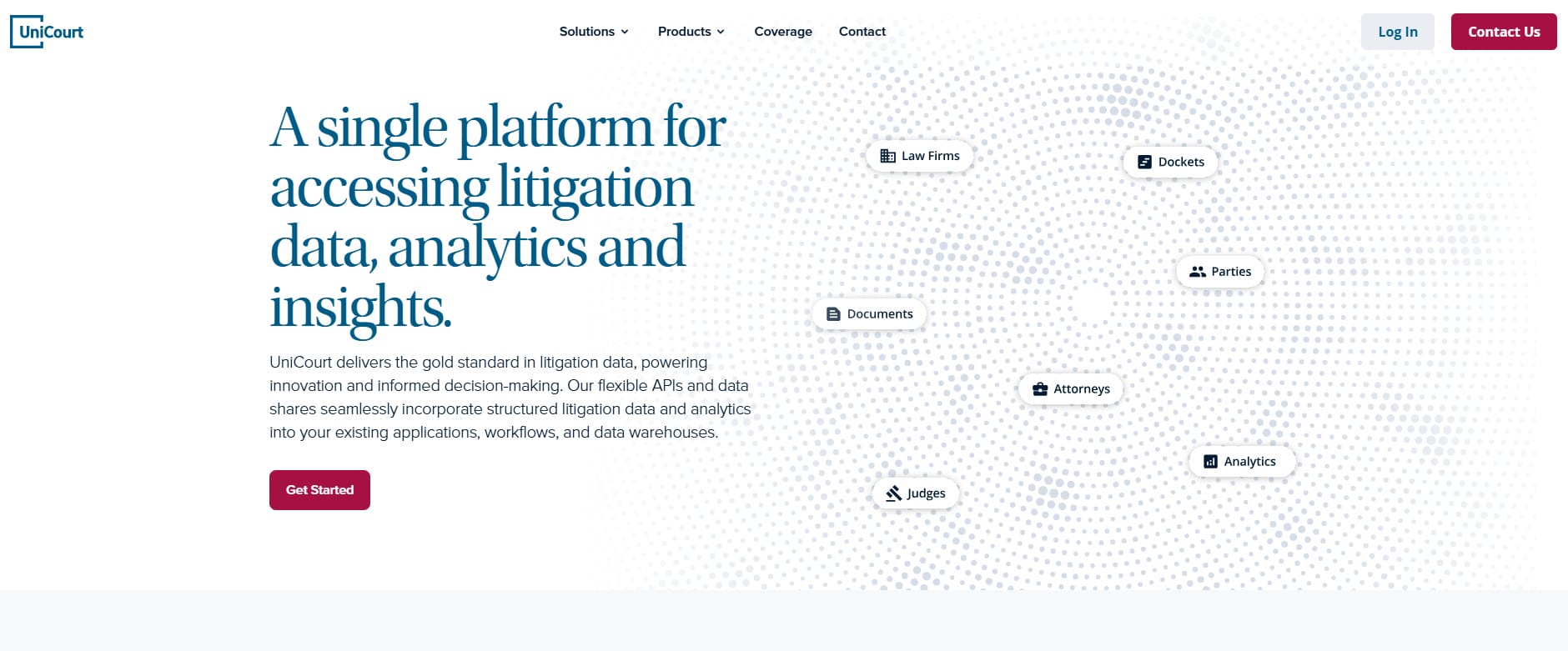
Source: UniCourt.com
The best feature of UniCourt is how it brings all kinds of legal data together under one roof. Whether you’re keeping tabs on a specific case, digging into legal precedents, or trying to spot trends in litigation, UniCourt lets you do it all without the need to jump between different databases.
Here are some of its key features:
- Automated court data access: Retrieves real-time case data from federal and state courts.
- Legal research & analytics: Provides AI-driven insights into case law, dockets, and litigation trends.
- Case tracking & alerts: Notifies users of case updates, filings, and procedural changes.
- API & data integration: Connects court records with legal and business intelligence platforms.
- Docket management: Centralizes court dockets for easy organization and access.
- Business & litigation intelligence: Identifies patterns in litigation, helping firms assess risks and opportunities.
- Document retrieval: Automates access to pleadings, motions, and other legal filings.
Aside from accessing data, UniCourt helps you manage it better. You can set up alerts to track cases automatically, so you’re always in the loop with real-time updates without constantly checking in manually.
Automate Discovery Drafting with Briefpoint.ai
Artificial intelligence is designed to eliminate the most tedious legal workflows. So, why not start with the most time-consuming tasks?
Briefpoint simplifies the process, cutting hours of manual work down to just minutes. With AI-powered automation, smart objections, and seamless client input collection through Briefpoint Bridge, your legal team can work faster and more efficiently—without sacrificing accuracy.
Stop spending valuable time on repetitive tasks. Try Briefpoint today and see how much time and money you can save. Schedule a demo now!
The Best Legal Technology Company for Discovery Documents
Discovery responses cost firms $23,240, per year, per attorney. $23,240 estimate assumes an associate attorney salary of $150,000 (including benefits – or $83 an hour), 20 cases per year/per associate, 4 discovery sets per case, 30 questions per set, 3.5 hours spent responding to each set, and 1800 hours of billable hours per year.
Book a demo and save on these costs with Briefpoint.
FAQs About Legal Service Providers
What is legal tech, and how does it benefit legal professionals and their clients?
Legal tech refers to the use of technology and software to provide legal services and support the operation of law firms and legal departments. Legal tech benefits legal professionals by streamlining workflows, reducing the time and cost associated with traditional legal processes, and enhancing the accuracy of legal documents and research.
For clients, legal tech can lead to quicker resolutions of legal matters, improved access to legal services, and, often, lower costs.
Can legal tech replace lawyers?
While legal tech software improves the efficiency and effectiveness of legal services, it is not designed to replace lawyers. Instead, it serves as a tool to assist lawyers in their work.
Technology can automate repetitive tasks and manage large volumes of data, but the nuanced judgment, ethical considerations, and client advocacy provided by human lawyers are beyond its current capabilities.
How is AI being used in legal tech, and what are its limitations?
AI in the legal industry is primarily used for automating document analysis, conducting legal research, predicting legal outcomes, and improving client service through chatbots and other interactive tools. It can sift through vast amounts of legal data to identify patterns, suggest relevant case law, and even draft legal documents.
How can legal drafting software benefit an international law firm?
Legal drafting software streamlines corporate and transactional issues by automating contract creation, compliance filings, and other essential documents. This reduces manual effort, ensures consistency across jurisdictions, and improves efficiency—ultimately freeing internal resources for higher-value legal work.
The information provided on this website does not, and is not intended to, constitute legal advice; instead, all information, content, and materials available on this site are for general informational purposes only. Information on this website may not constitute the most up-to-date legal or other information.
This website contains links to other third-party websites. Such links are only for the convenience of the reader, user or browser. Readers of this website should contact their attorney to obtain advice with respect to any particular legal matter. No reader, user, or browser of this site should act or refrain from acting on the basis of information on this site without first seeking legal advice from counsel in the relevant jurisdiction. Only your individual attorney can provide assurances that the information contained herein – and your interpretation of it – is applicable or appropriate to your particular situation. Use of, and access to, this website or any of the links or resources contained within the site do not create an attorney-client relationship between the reader, user, or browser and website authors, contributors, contributing law firms, or committee members and their respective employers.
